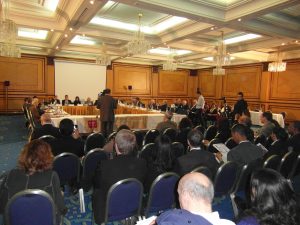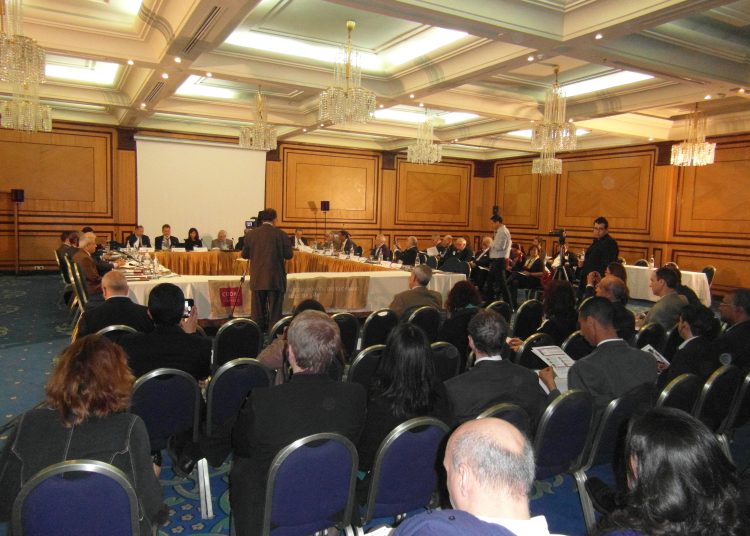By Sami Zaptia.

Tripoli, 01 April 2013:
Further to my article yesterday summarizing the Stanford University conference in Tunis on transition in . . .[restrict]the three Arab Spring nations, I continue today with the rest of those deliberations. The aim of attending the conference was to see if there were shared experiences that we as Libyans could benefit from.
When it came to looking for similarities with Libya, the speaker who best summarized and encapsulated the Libyan-Tunisian similarities was, Said Ferjani spokesperson for the Ennahda party.
If you substituted the words Bens Ali and Tunisia for Qaddafi and Libya, the scenario fitted like a glove.
“Ben Ali has gone, but the structures are still there”, said Ferjani. “The culture is still there. Dictatorship achieves stability easily. Transitional democracy is more difficult. We have to be patient and progress is achieved incrementally”.
“There are no quick fixes. It is a process. We have to deal with a legacy. He admitted that progress in Tunis was not as expected, but insisted there was change, even though many had not tasted that change. He warned that economic and social change had to go hand-in-hand with political change.
Former member of Libya’s National Transitional Council (NTC) and law professor at Benghazi University Salwa El Daghili noted that Libya’s General National Congress (GNC) main aim was constitutional. It was to choose the drafting ‘Committee of 60’ to draft the constitution.
However, she pointed out that this power was taken away from them on the last day of the life of the NTC this power was taken away from the GNC. The NTC ruled that the GNC should arrange elections for the drafting committee of 60. This is bad news for women Daghili said because women were only able to get seats in the GNC via the list system quota. Only one GNC female member was elected independently she added.
However, recently, the Constitutional Court ruled that the NTC law change was unconstitutional and that as the law stands, the GNC could select the constitutional drafting committee of 60. Libya is back to square one she added. Daghili noted that at least Tunisia and Egypt were at the drafting stages, whereas Libya was still at the stage of agreeing the process of choosing the drafting committee.
She felt that the Libyan constitution should set out clearly the role of Sharia law, women, minorities and their languages. These issues should not be postponed, they should be dealt with now, she felt. Once passed, a constitution is hard to amend, she noted.
Daghili felt that the time limit imposed by the NTC and the Temporary Constitutional Declaration for the drafting of the constitution was too short. She felt that since the transitional state was not in full control, trying to build a state and its institutions, while dealing with its pre-set constitutional responsibilities. She felt that drafting a constitution needed some consensus between all the people.
Charles Tripp, Professor of Politics at SOAS, London, in his presentation took the debate onto a higher conceptual level.
He noted that citizens from the Arab Spring states came out onto the streets and occupied the political space. But will it have real power, or will the public be used as a sham, and real power be held elsewhere, he wondered. Will this ‘shadow or deep state’ be repeated as in the past with dictatorships hiding behind the public?
Tripp noted that representative institutions do not necessarily lead to representation. Some regard the US system as being controlled by capitalists as opposed to citizens. Some states allow participation but not rights as they fear rights are corrosive on their control of power.
Meaningful citizenship does not disenfranchise its citizens beyond setting up formal institutions, Tripp explained. There is a need for mechanisms to ensure that institutions act as servants of citizens. Democracy requires constant vigilance, Tripp added. He also noted that Locke said that if you give someone power, you should no longer trust them and that you should monitor them democratically. The true republic is about citizens’ rights, Tripp added.
Finally, putting matters into perspective with regards to constitutions and rights, Tripp highlighted the fact that Britain has no written constitution and that its head of state inherits its role and is neither elected nor voted in. The system is based on political culture – yet rights and minorities are still protected.
For my part, I interjected noting that democracy is a culture and that that culture has taken centuries if not a couple of millennia in the British Isles to reach the stage it has reached today. It is still not regarded as perfect. Yet the Arab Spring revolutions are only two years old. In my opinion, they have achieved quite a lot in such a short period of time.
On the other hand, institutions and constitutions are one thing, political, social and economic rights, representation, equality, justice are another. As Charles Tripp noted, one does not guarantee the other. An agreed political consensus and culture is the glue or oil that makes them work better. This consensus needs time to mature.
The Arab Spring youth are impatient with often unrealistic expectations. They want everything and they want it now. There is too much expected of the inexperienced legislative and executive arms – under pressure to draft constitutions and fulfil everyday demands, including securing the unity of the state and its security. [/restrict]










